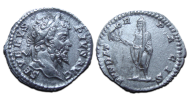
- Stock: Sold
- Model: denarius Q. Cassius Longinus Jupiter
Q. Cassius Longinus AR Denarius. 55 BC. Bust of young Jupiter, sceptre behind / Eagle on thunderbolt right between lituus and jug; Q CASSIVS below. Sydenham 916, Crawford 428/3. 3.91g, 17 mm
The youthful bust on this coin is often described as being that of Bonus Eventus, however unlike the coins of the Scribonii, there is no legend or defining attribute to identify it as such. Indeed, the sceptrum, fulmen and aquila instead point to this being the bust of a young Jupiter, for whom such insignia are normally reserved. The priestly implements on the reverse likely allude to an ancestor who belonged to the college of pontiffs, and if we take the symbolism of this coin to be in reference to Jupiter, then it is probable that this coin is in reference to a family member who was once Flamen Dialis, (high priest of Jupiter), a position of great importance and privilege in Rome that entitled the holder of that office to many honours, including the right to a lictor, the toga praetexta, the sella curulis, and to a seat in the Senate.
The moneyer of this coin, Quintus Cassius Longinus, was the brother or cousin of the Cassius who conspired to assassinate Caesar. In 49 BC, as tribune of the people, he strongly supported the cause of Caesar, by whom he was made governor of Hispania Ulterior. He treated the provincials with great cruelty, and his appointment in 48 BC to take the field against Juba I of Numidia gave him an excuse for fresh oppression. The result was an unsuccessful insurrection at Corduba. Cassius punished the leaders with merciless severity, and made the lot of the provincials harder than ever.
Some of his troops revolted under the quaestor Marcellus, and Cassius was surrounded in Ulia. Bogud, king of Mauretania, and Lepidus, proconsul of Hispania Citerior, to whom Cassius had applied for assistance, negotiated an arrangement with Marcellus whereby Cassius was allowed to go free with his remaining legions. Cassius sent his troops into winter quarters and boarded ship at Malaca with his ill-gotten gains, but was wrecked in a storm at the mouth of the Iberus. His tyrannical behaviour in Hispania greatly injured Caesar’s cause.
